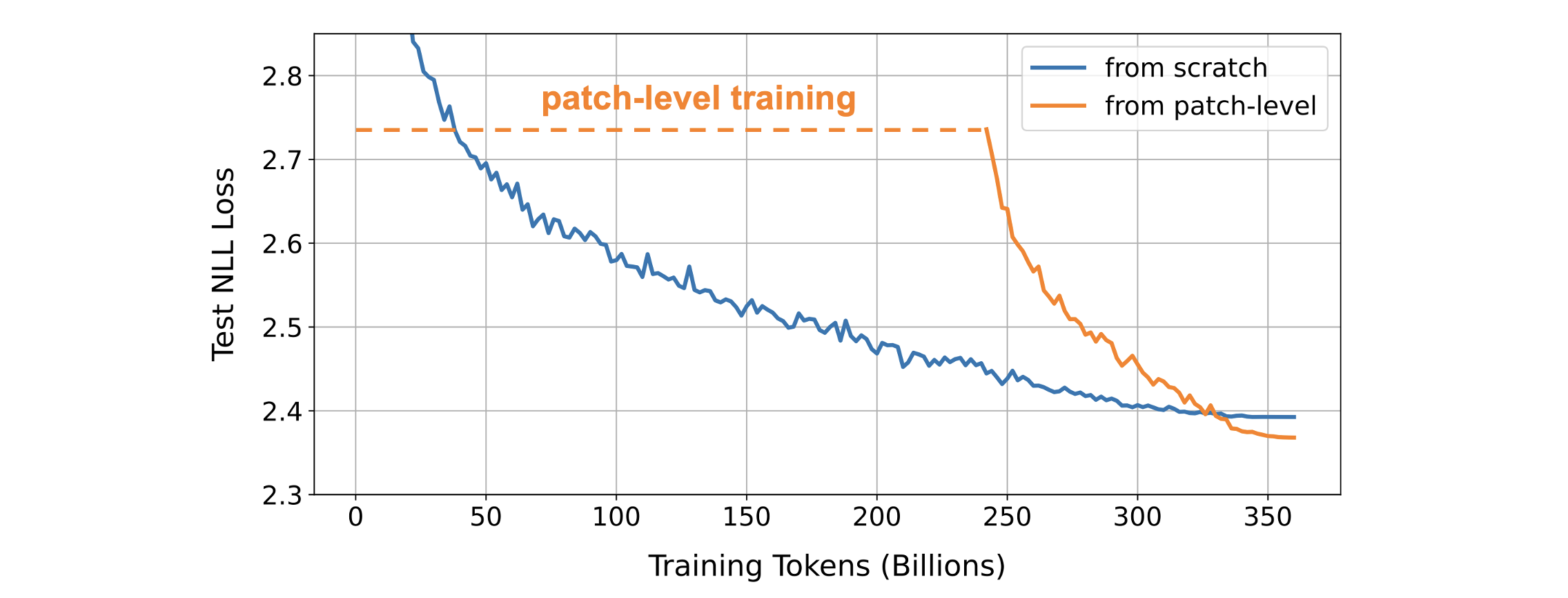This repo contains the code for our paper Patch-Level Training for Large Language Models.
Patch-level training is an efficient training approach for large language models (LLMs), in which models read training data in patches and learn to predict the next patch. Following this, a small amount of training data is used to adjust the model to the token-level. This approach can achieve an even lower loss in comparison with training from scratch, while reducing training costs by half.
The implementation of patch-level training is quite straightforward, with only 10 lines of core code – feel free to directly incorporate it into your LLM training code. Our implementation is based on the LLaMA model modeling_llama.py, with the primary changes as follows:
884 num_patches = seq_length // self.patch_size
885 inputs_embeds = inputs_embeds.view(batch_size, num_patches, self.patch_size, -1).mean(2)
886 position_ids = position_ids[:, :num_patches]1058 shift_logits = logits[..., :-1, :].reshape(-1, self.config.vocab_size)
1059 shift_labels = labels[..., self.patch_size:].reshape(-1, self.patch_size)
1060 loss_fct = CrossEntropyLoss()
1061 loss = 0
1062 for i in range(self.patch_size):
1063 loss = loss + loss_fct(shift_logits, shift_labels[:, i])
1064 loss = loss / self.patch_sizeWe provide an example here for quick replication. Required environment: transformers>=4.34.
Due to copyright issues, the pile dataset is not publicly available now. An alternative is pile-uncopyrighted, which contains approximately 25% fewer tokens than pile. First, run the following script to download and pre-process the pile-uncopyrighted dataset, getting ~270B tokens:
bash get_data.shNext, train a Transformer with 370M parameters on the pile-uncopyrighted dataset. Run the following script for token-level training:
bash run_token.shRun the following script to perform patch-level training with a patch size of K=4 on 180B tokens, followed by token-level training on 90B tokens.
bash run_patch.shIn practice, the acceleration rate of patch-level training is lower than the patch size K. This is primarily due to the time consumed in data loading and processing, especially the tokenization takes a lot of time. The acceleration rate will be much closer to K if the streaming mode is disabled.
Below are the loss curves obtained from our training on the Pile dataset (360B tokens), provided for reference.

If you find the resources in this repository useful, please cite as:
@article{shao2024patch,
title={Patch-Level Training for Large Language Models},
author={Shao, Chenze and Meng, Fandong and Zhou, Jie},
journal={arXiv preprint arXiv:2407.12665},
year={2024}
}